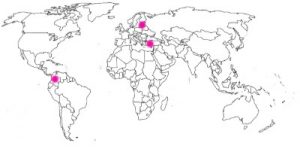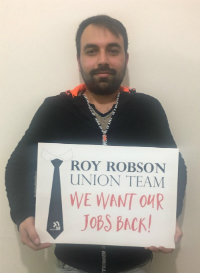Presentation to ILO event ” Communication Strategies to Strengthen Workers’ Organizations: Advocacy and Campaigns”, Geneva – 7 February 2017
by Eric Lee
First of all, thank you very much to ACTRAV for the opportunity to speak with trade unionists from all over the world. And thank you for letting me hear some of your thoughts in the questionnaires you filled in – which I hope will guide some of this discussion today.
Though I’ve been invited to speak for the session on advocacy and campaigns, I’d like to say a word about an issue a number of you raised in your answers to the questionnaire.
Many of you pointed out the problem of mass media that either ignore trade unions, or are hostile to trade unions. This is a subject that is very important to me and it is the reason why LabourStart was created 19 years ago. We wanted to create a space on the web where trade unionists could learn about each others’ struggles and problems – and victories. And we created a news service that works in dozens of languages. We have a network of over 850 volunteers who regularly add links to news stories to our database. We typically link to 200 or more news stories every day, all over the world. So if you want to know what’s happening in the labour movement anywhere in the world, you should start by visiting LabourStart.org. And if you don’t see news from your union or your country there, you should volunteer to be a correspondent.
I should also mention that you don’t need to visit LabourStart’s website to see the news we’ve collected. We have had a labour newswire for many years which shares our content on hundreds of trade union websites.
But as the focus of this session is on advocacy and campaigns, I want to introduce you to LabourStart’s online campaigns.
Let me start not with the technology, but with the real world. The only reason I am here today to speak with you is that we have had many success stories where our online campaigns have contributed to workers’ victories. Those online campaigns have helped get jailed worker activists released from prison, end company lockouts, bring employers back to the negotiating table, win union recognition, and much more.
About five years ago, the military dictatorship in Fiji jailed two of the country’s most prominent trade union leaders. Following the launch of an online campaign sponsored by the International Trade Union Confederation (ITUC) and run on the LabourStart website, some 4,000 messages of protest were sent in less than 24 hours. The government relented, the union leaders were freed, and the campaign suspended.
A month earlier, Suzuki workers locked out in India waged a successful online campaign through the International Metalworkers Federation – now IndustriALL – and LabourStart. Almost 7,000 messages flooded the company’s inboxes, and after only a few days, a compromise was reached.
We’ve had so many victories like those that a couple of years ago, we produced a short book called Campaigning Online and Winning. We’ve now finished writing a new version of that book – it’s much longer – listing lots of other campaigns we’ve helped to win. That book should be available later this month.
The spectacular success of those campaigns is the culmination of a 20 year long process of building up the campaigning capacity of the international trade union movement – specifically that of the ITUC and the global union federations (including IndustriALL, the IUF, and others), and the role played by LabourStart in that process.
My talk today will focus on the rather narrow topic of global online labour campaigns, to see where we have been, where we are now, and to speculate where we go next.
The global labour movement has been doing online campaigning for more than thirty years. The first international trade secretariats (now called global union federations) went online in the 1980s and have been campaigning ever since. For more than a decade, we have campaigned using a combination of mass emailings and web-based tools mostly modelled on successful campaigning websites such as Avaaz and 38 Degrees (in the UK).
Today the ITUC and the GUFs tend to campaign either using LabourStart, or using a system similar to (and based on) LabourStart’s custom-built software. As a result of this, LabourStart’s mailing lists have grown steadily, from just a couple of thousand at the beginning of this century to more than 135,000 today. Those mailing lists of trade union activists are at the heart of online labour campaigning today. They are what allow us to deliver thousands of protest messages in 24 hours.
But the potential is much greater than this. The ITUC, for example, represents 181 million workers in 163 countries. The 135,000 names of activists on LabourStart’s lists are a tiny fraction of that number – less than one in a thousand. 99.9% of the members of ITUC-affiliated unions are not yet on our mailing list. There is a lot of room for growth.
Other campaigning organizations, which have grown up out of nowhere with no built-in membership base like trade unions, have much larger audiences. For example, Avaaz claims over 44 million supporters world-wide; the UK’s 38 Degrees website claims 3 million supporters. Unions have been slow to pick up on the importance of online campaigning, and as a result lag behind NGOs like these.
And it’s not only NGOs. Political campaigns have also managed to mobilise vast numbers of people. I was very active in the campaign last year to select Senator Bernie Sanders to be the Democratic nominee for President of the United States. The size our our campaign, the number of people involved, was far greater than anything I’ve seen done by the trade union movement online.
Why unions lag behind in the adoption of effective online campaigning technology is complicated, and varies from union to union and from country to country. As the widespread use of social networks like Facebook during the Arab Spring showed, there is no simple North/South divide here. Some of the most powerful unions in some of the richest countries use the net poorly. And there have been extremely effective net-based campaigns run by unions in the global South.
The global trade union movement is already experiencing the problems of campaign fatigue and information overload. There is a fear that the campaigning model which has worked well for a decade may be faltering. And there are questions about what comes next.
I want to spend the rest of my talk focussing on that – on the future of online campaigning in the trade union movement.
One noticeable trend is a growth in the number of languages we campaign in. LabourStart has a new campaign demanding that the Norwegian energy company DNO treat its workers in Yemen fairly. That campaign appears, of course, in English, Norwegian and Arabic. But it also appears in 12 other languages too.
This is far cry from the days when unions would publish online in just English, French and Spanish. LabourStart campaigns now appear in Turkish, Arabic, Russian, Chinese, and Japanese – hugely important languages for the international trade union movement, but ones which a decade ago were rarely seen on global labour websites.
We can expect in the next decade to see even more languages used — especially the languages of countries with growing industrial working classes, such as Thai, Tagalog, Korean, Portuguese, Indonesian and Vietnamese. A decade from now, it will not be unusual to see online campaigns running in dozens of languages.
The model for today’s global online labour campaigns remains very PC-centric. We imagine thousands of trade unionists working in offices, sitting at their desks reading an email, clicking on a link, opening a website and filling in a form. But already today, this is not how people actually work.
A significant percentage of those now learning about a global labour campaign via email are reading that email in a smartphone. If they click on a link in the message, the website that displays must render correctly on a small screen, and the entering of data such as one’s name and email address, must be as simple and easy as possible. Few unions have taken this into account, but it will be essential in the years to come. As a result, it is likely that we will see the rise of small-screen-specific campaigning apps for trade unions. These apps will need to be platform-independent, able to work on all kinds of phones and tablets.
And of course the model of email messages pointing to websites is itself fading, as more and more people come to use social networks such as Twitter and Facebook as their models for online communication. Among young people, studies show a declining use of email and an increasing reliance on other tools, including WhatsApp, Facebook Messenger, and Snapchat.
Unions need to take this into account when deciding how to promote their campaigns, and they need to use simultaneously a wide range of media — including social networks and instant messaging — to reach their members and supporters. Email is likely to remain part of that package, but can no longer be the only way to get the word out.
A decade from now we will probably discover other things online protest campaigns can do beyond filling up the inbox of employers and governments with protest messages. It’s likely that we’ll continue to do that, but we also need to find other ways of putting pressure on governments and employers to respect workers’ rights.
One of the traditional trade union tools that has been under-utilised in recent years has been the boycott — and its opposite, the “buy union” campaigns. Both can be done more effectively online and at a fraction of the cost of old-fashioned offline versions. In a hyper-competitive market, if unions can cause a tiny fraction of sales to fall for one company, and to rise for another, this might give us the leverage that we never had in the past.
And beyond using our power as consumers to reward and punish companies, we can be inspired by the example of the Arab Spring, Occupy and other movements and consider the possibility of using online campaigns not only to apply pressure online, but as a tool to bring people into the streets.
In the years to come global unions will still campaign online, but they will do so in ways radically different from how we work today — and the result will be more powerful and effective trade unions. But to achieve that, we must be open to new ideas, and new ways of working.
 ILO: We gave extensive publicity on LabourStart’s home page and across social media to some key developments at the meeting of the ILO Governing Body last week — including the passage of a resolution on Ukraine and Russia, and the election of a new, union-backed Director General.
ILO: We gave extensive publicity on LabourStart’s home page and across social media to some key developments at the meeting of the ILO Governing Body last week — including the passage of a resolution on Ukraine and Russia, and the election of a new, union-backed Director General.


